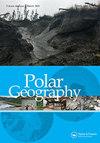因纽特青年参与社区环境研究,支持加拿大努纳武特的地方发展
IF 1.6
Q3 GEOGRAPHY, PHYSICAL
引用次数: 1
摘要
社区在北极环境研究中的领导作用越来越被认为有助于北极地区的土著自决和可持续发展。虽然有经验的因纽特人收割者、猎人、诱捕者和其他公认的环境知识专家在很大程度上参与了研究,但因纽特青年的类似机会仍然有限。我们的研究探索了社区参与环境研究的途径,以作为因纽特青年体验学习的一种形式,并提高北极社区的能力。为此,我们通过访谈和研讨会,考察了来自努纳武特Pond Inlet (Mittimatalik)的41名北方人的观点,其中包括19名年龄在18至35岁之间的因纽特青年。我们发现研究人员和因纽特青年之间的师徒关系可以提高科学素养,并补充传统的学习途径和观察学习。另一方面,通过吸引因纽特青年,研究人员可以从新一代北方土著人民的经验和知识中受益,他们在设计解决当地优先事项的研究时具有独特的地位,重视多种世界观。本文章由计算机程序翻译,如有差异,请以英文原文为准。
Inuit youth-engaged community-based environmental research as supporting local development in Nunavut, Canada
ABSTRACT Community leadership in Arctic environmental research is increasingly recognized to contribute to Indigenous self-determination and sustainable development in the Arctic. While experienced Inuit harvesters, hunters, trappers, and other recognized environmental knowledge experts are largely included in research, similar opportunities for Inuit youth remain limited. Our study explored pathways for community-based engagement in environmental research to serve as a form of experiential learning for Inuit youth and enhance capacity in Arctic communities. For that, we examined, through interviews and workshops, the perspectives of 41 northerners from Pond Inlet (Mittimatalik), Nunavut, including 19 Inuit youth aged between 18 and 35 years old. We found that mentor-mentee relationships between researchers and Inuit youth may enhance scientific literacy and complement traditional learning pathways and observational learning. On the other side, by engaging Inuit youth, researchers may benefit from the experiences and knowledge of this new generation of northern Indigenous peoples uniquely positioned to value multiple worldviews in designing studies that address local priorities.
求助全文
通过发布文献求助,成功后即可免费获取论文全文。
去求助
来源期刊

Polar Geography
GEOGRAPHY, PHYSICAL-
CiteScore
5.30
自引率
0.00%
发文量
13
期刊介绍:
Polar Geographyis a quarterly publication that offers a venue for scholarly research on the physical and human aspects of the Polar Regions. The journal seeks to address the component interplay of the natural systems, the complex historical, political, economic, cultural, diplomatic, and security issues, and the interchange amongst them. As such, the journal welcomes comparative approaches, critical scholarship, and alternative and disparate perspectives from around the globe. The journal offers scientists a venue for publishing longer papers such as might result from distillation of a thesis, or review papers that place in global context results from coordinated national and international efforts currently underway in both Polar Regions.
 求助内容:
求助内容: 应助结果提醒方式:
应助结果提醒方式:


